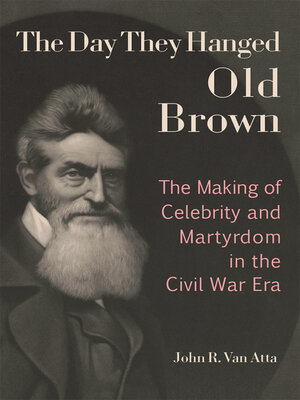The Day They Hanged Old Brown
ebook ∣ The Making of Celebrity and Martyrdom in the Civil War Era
By John R. Van Atta

Sign up to save your library
With an OverDrive account, you can save your favorite libraries for at-a-glance information about availability. Find out more about OverDrive accounts.
Find this title in Libby, the library reading app by OverDrive.



Search for a digital library with this title
Title found at these libraries:
| Library Name | Distance |
|---|---|
| Loading... |
Abolitionist, fanatic, terrorist, freedom fighter, alleged murderer—all of those labels fit John Brown. Yet he also qualified as a mid-nineteenth-century celebrity. Reserved only for a few, celebrity in Brown's time was, in historian Carolyn Eastman's words, a quality "of being well known, an attribute, a degree of popularity and fame—the state of being celebrated by others," as Brown certainly was.
Brown's lifespan covered most of the period between the Revolution and the Civil War, a time of the still-early beginnings of the United States. Only then had his kind of "celebrity" started to matter. From different economic and moral perspectives, politically aware Americans clashed over different visions for the future of the country. At that time, any disruptive figure might be taken as a barometer of the progress or the decline of the republic. A function of the widely varying newspapers and magazines of that day, celebrity offered Americans an angle of vision, happily or not, as to who they were or were becoming or believed themselves to be—as if by a mirror reflection.
In The Day They Hanged Old Brown, John Van Atta examines the creation of celebrity in John Brown's time and how it differed from modern day perceptions. Yet, as applicable as the concept of celebrity is in this case, the story of Brown's notoriety represents far more. To his admirers, Brown was not merely a celebrity; he was a hero and, after his sacrificial death, a martyr. Not all celebrities rise to such levels. This book traces the meaning of heroism and martyrdom—as well as the opposite side of that coin, villainy—and suggests that John Brown's story and legacy helped to redefine these concepts for many Americans during the era of the Civil War, before modern historians began to deliberate him.
Brown's lifespan covered most of the period between the Revolution and the Civil War, a time of the still-early beginnings of the United States. Only then had his kind of "celebrity" started to matter. From different economic and moral perspectives, politically aware Americans clashed over different visions for the future of the country. At that time, any disruptive figure might be taken as a barometer of the progress or the decline of the republic. A function of the widely varying newspapers and magazines of that day, celebrity offered Americans an angle of vision, happily or not, as to who they were or were becoming or believed themselves to be—as if by a mirror reflection.
In The Day They Hanged Old Brown, John Van Atta examines the creation of celebrity in John Brown's time and how it differed from modern day perceptions. Yet, as applicable as the concept of celebrity is in this case, the story of Brown's notoriety represents far more. To his admirers, Brown was not merely a celebrity; he was a hero and, after his sacrificial death, a martyr. Not all celebrities rise to such levels. This book traces the meaning of heroism and martyrdom—as well as the opposite side of that coin, villainy—and suggests that John Brown's story and legacy helped to redefine these concepts for many Americans during the era of the Civil War, before modern historians began to deliberate him.







